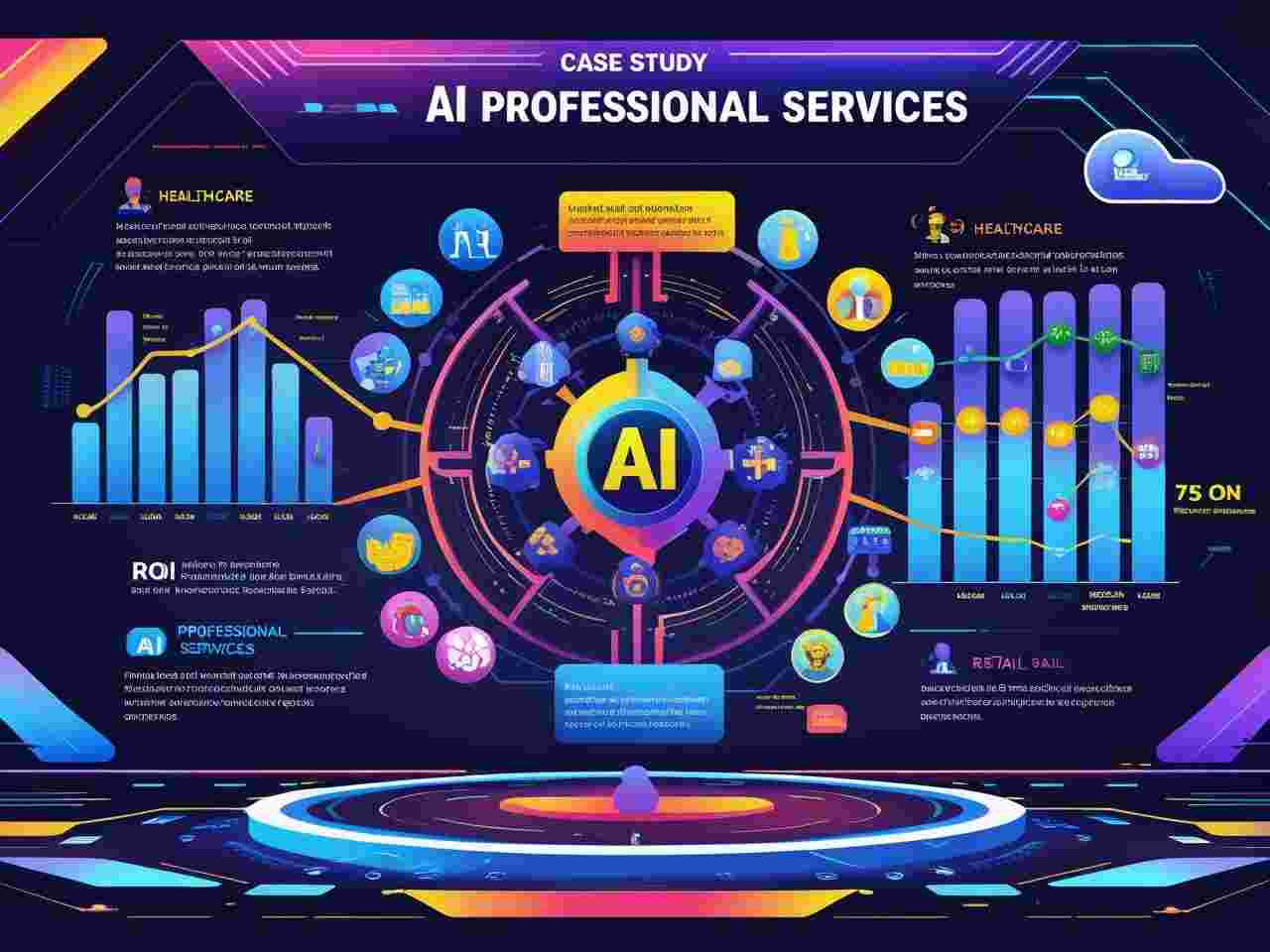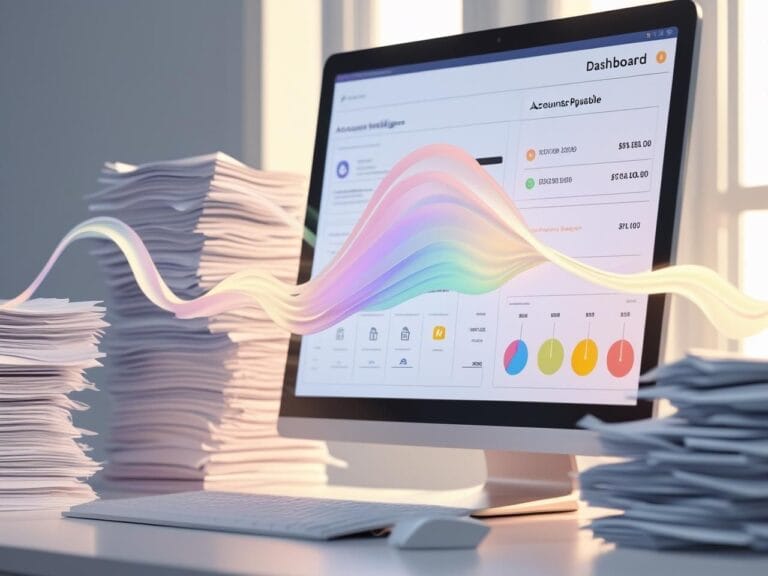7 Key Artificial Intelligence Professional Services: What They Are, How They Work, and Why They Matter
Artificial Intelligence Professional Services: What They Are, How They Work, and Why They Matter
In today’s fast-moving world, businesses are racing to stay ahead—and Artificial Intelligence Professional Services are quickly becoming their secret weapon. From predicting customer needs to automating repetitive tasks, AI is no longer just a tech buzzword; it’s a practical solution driving real growth. Companies across industries are hiring experts who can design, implement, and maintain AI systems tailored to their unique challenges.
So, what exactly are Artificial Intelligence Professional Services? In simple terms, they’re specialized services provided by AI experts who help organizations integrate smart technologies into their operations. Think of them as your business’s AI partners—people who don’t just hand you a tool but also guide you in using it effectively.
In this post, we’ll explore what these services are, how they work behind the scenes, and why they matter more than ever in today’s competitive market. By the end, you’ll see how they can help transform your business from simply surviving to thriving in the age of intelligent innovation.
What Are Artificial Intelligence Professional Services?
Artificial Intelligence Professional Services are specialized, AI-driven consulting, implementation, and optimization solutions designed to help businesses harness the full potential of intelligent technologies. They’re not just about building cool algorithms—they’re about crafting tailor-made strategies that solve real business problems, improve efficiency, and unlock new opportunities.
At their core, these services bring together expert knowledge of AI tools and techniques with a deep understanding of business operations. Whether you’re a small startup aiming to automate routine tasks or a global enterprise looking to predict market trends, AI professionals work with you to design systems that fit your goals.
Here are some of the most common types of Artificial Intelligence Professional Services:
- AI Strategy Consulting – Helping businesses identify where and how AI can make the most impact, aligning technology with business objectives.
- Machine Learning Model Development – Creating predictive models that learn from data to make smarter, faster decisions.
- Natural Language Processing (NLP) Solutions – Building systems that understand and respond to human language, from chatbots to sentiment analysis.
- Computer Vision Applications – Enabling machines to interpret visual data for tasks like quality control, facial recognition, or medical imaging.
- AI-Powered Automation – Streamlining processes such as customer service, data entry, and workflow management.
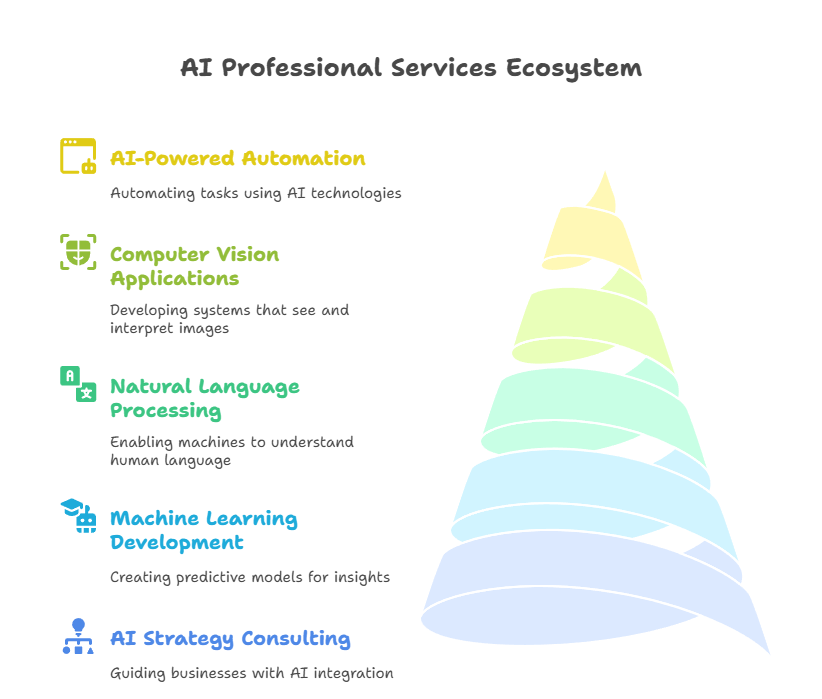
With these services, businesses don’t just adopt AI—they integrate it strategically, ensuring long-term benefits and competitive advantage.
How Artificial Intelligence Professional Services Work
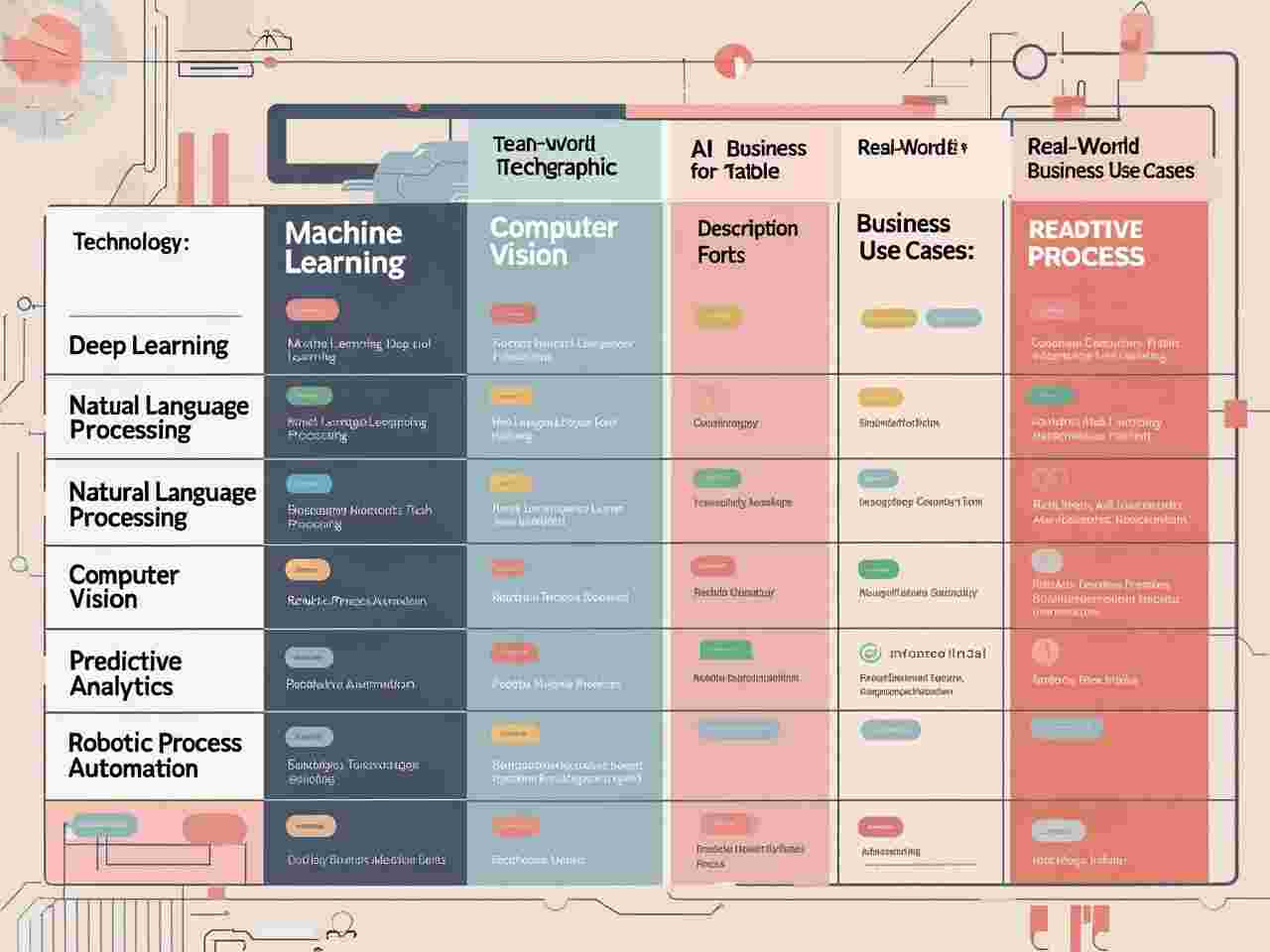
Artificial Intelligence Professional Services follow a well-structured, collaborative process that ensures AI solutions don’t just work in theory but deliver real-world results. It’s a journey that starts with understanding your business and ends with measurable improvements in efficiency, decision-making, and innovation.
Step-by-Step Service Process
- Needs Assessment & Strategy Planning – Experts analyze your current operations, challenges, and goals to identify where AI can deliver the most value.
- Data Collection & Preparation – Relevant data is gathered, cleaned, and organized to ensure accurate AI model training.
- Model Training & Testing – Machine learning algorithms are developed, tested, and refined to achieve optimal performance.
- Deployment & Integration into Business Systems – AI models are embedded into your existing workflows, ensuring seamless adoption without disrupting operations.
- Ongoing Monitoring & Optimization – Continuous tracking of AI performance with updates and fine-tuning to keep the system effective over time.
This process ensures AI doesn’t become a “set it and forget it” tool—it’s a living, evolving asset to your business.
Technologies Behind AI Professional Services
- Machine Learning & Deep Learning – Algorithms that learn from data and adapt over time for tasks like forecasting or recommendations.
- Natural Language Processing (NLP) – Enables machines to understand, interpret, and generate human language.
- Computer Vision – Allows AI to “see” and analyze images or videos for quality control, security, and more.
- Predictive Analytics – Uses historical data to forecast trends and future outcomes.
- Robotic Process Automation (RPA) – Automates repetitive tasks such as data entry, billing, or report generation.
Table: Comparing AI Technologies and Their Applications in Professional Services
| AI Technology | Primary Function | Common Business Applications |
| Machine Learning | Pattern recognition & prediction | Demand forecasting, fraud detection |
| NLP | Language understanding | Chatbots, sentiment analysis, document processing |
| Computer Vision | Image & video analysis | Quality inspection, facial recognition |
| Predictive Analytics | Forecasting future trends | Sales predictions, risk management |
| RPA | Process automation | Invoice processing, HR onboarding |
Why Businesses Need Artificial Intelligence Professional Services
In today’s hyper-competitive market, standing still is the fastest way to fall behind. Artificial Intelligence Professional Services give companies the tools and expertise they need to adapt, grow, and thrive. By combining advanced AI technologies with strategic guidance, these services transform raw data into powerful business outcomes.
Competitive Advantages
- Data-Driven Decision-Making – Instead of relying on gut instinct, businesses can use AI insights to make faster, smarter, and more accurate choices.
- Faster Innovation Cycles – AI accelerates research, product development, and service improvements, helping companies stay ahead of changing trends.
- Cost Reduction & Efficiency Gains – Automation cuts down on repetitive tasks, reduces human error, and optimizes operations—saving both time and money.
Real-World Examples
- AI in Healthcare Diagnostics – Hospitals use AI-driven imaging and predictive analytics to detect diseases earlier and improve patient care. For example, AI systems can spot signs of cancer in scans that human eyes might miss.
- AI in Finance for Fraud Detection – Banks rely on machine learning algorithms to monitor millions of transactions in real time, identifying suspicious activity before it escalates into costly fraud.
- AI in Retail for Personalized Marketing – E-commerce brands leverage AI to recommend products based on browsing and purchase history, leading to higher conversion rates and customer loyalty.
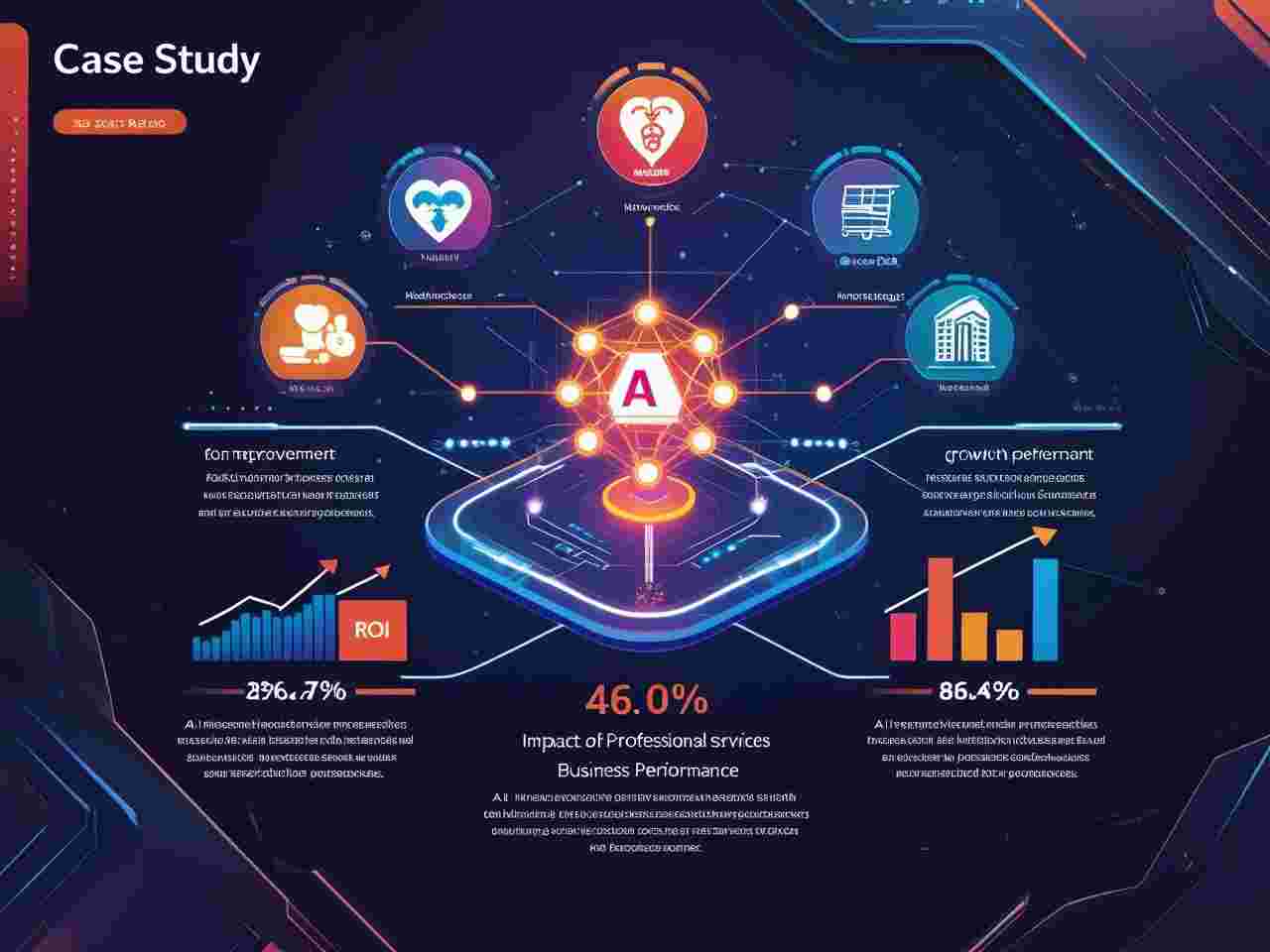
From saving lives to protecting money and delivering shopping experiences customers love, Artificial Intelligence Professional Services are proving to be more than just a tech investment—they’re a business necessity.
Choosing the Right Artificial Intelligence Professional Services Provider
Selecting the right AI partner can make or break your business’s success with Artificial Intelligence Professional Services. It’s not just about hiring someone who knows AI—it’s about finding a team that aligns with your goals, understands your industry, and can deliver measurable results.
Key Factors to Consider
- Industry Expertise – Choose a provider familiar with your sector. An AI solution for healthcare differs greatly from one for retail or finance.
- Technology Stack – Ensure they use up-to-date AI technologies and tools compatible with your existing systems.
- Client Portfolio & Case Studies – Look at their past projects to gauge experience, innovation, and results.
- Post-Deployment Support – AI systems need ongoing monitoring, maintenance, and optimization. A good provider offers long-term support, not just a one-time setup.
Common Mistakes to Avoid
Avoid providers who overpromise instant results or offer generic “one-size-fits-all” AI solutions. Lack of transparency, minimal industry experience, or poor support can lead to wasted investment and missed opportunities.
Choosing wisely ensures your AI journey is smooth, efficient, and truly transformative, turning complex technology into a practical advantage for your business.
Challenges and Risks in AI Professional Services
While Artificial Intelligence Professional Services offer tremendous benefits, businesses must navigate certain challenges to ensure successful outcomes. Understanding these risks upfront helps organizations plan effectively and avoid costly mistakes.
- Data Privacy & Compliance Concerns – AI systems rely on large volumes of sensitive data. Ensuring compliance with regulations like GDPR and CCPA is critical to avoid legal issues and maintain customer trust.
- High Implementation Costs – Developing and deploying AI solutions can require significant investment in technology, infrastructure, and expert talent, which may strain budgets if not carefully managed.
- Skills Gap & Training Needs – Implementing AI often demands specialized knowledge. Organizations must either hire skilled professionals or invest in training existing staff to use AI effectively.
- Ethical AI Considerations – Decisions made by AI systems can have wide-reaching social or ethical implications. Ensuring fairness, transparency, and accountability is essential to prevent bias or unintended consequences.
By proactively addressing these challenges, businesses can harness AI safely and strategically, turning potential risks into opportunities for growth and innovation.
Future of Artificial Intelligence Professional Services
The future of Artificial Intelligence Professional Services is bright, dynamic, and full of opportunities for businesses willing to embrace innovation. Adoption is accelerating across industries—from healthcare and finance to retail and manufacturing—driven by the demand for smarter, faster, and more efficient solutions.
Emerging technologies are reshaping the AI landscape. Integration with the Internet of Things (IoT), blockchain, and AR/VR is enabling businesses to collect richer data, enhance security, and create immersive customer experiences. Meanwhile, AI-as-a-Service (AIaaS) models are making these advanced tools more accessible, allowing companies of all sizes to leverage AI without heavy upfront investments.
Looking ahead, the next 5–10 years promise even more transformative change. AI Professional Services will likely become deeply embedded in everyday operations, helping organizations anticipate market trends, automate complex tasks, and deliver personalized experiences at scale. Companies that adopt these services early will enjoy a clear competitive edge in the increasingly AI-driven economy.
Frequently Asked Questions (FAQ)
What is an example of AI professional services?
An example of Artificial Intelligence Professional Services is AI strategy consulting combined with machine learning model development. For instance, a retail company may hire AI experts to build a predictive analytics system that recommends products to customers based on their browsing and purchase history, improving sales and customer engagement.
How much do AI professional services cost?
The cost of AI professional services varies widely depending on project complexity, technology used, and provider expertise. Simple AI solutions like chatbots or basic automation may start from a few thousand dollars, while advanced projects involving custom machine learning models, NLP systems, or computer vision applications can run into tens or even hundreds of thousands. Factors like data quality, integration requirements, and ongoing support also influence pricing.
Can small businesses benefit from AI professional services?
Absolutely. Small businesses can leverage AI services to automate repetitive tasks, gain insights from customer data, and personalize marketing efforts. For example, a local e-commerce store might use AI-powered recommendations or automated email campaigns to increase sales without hiring additional staff. AI-as-a-Service (AIaaS) models make these solutions more affordable and accessible for smaller organizations.
Are AI professional services safe?
Yes, when provided responsibly. Trusted AI service providers prioritize data security, comply with regulations like GDPR and CCPA, and implement ethical AI practices. Businesses should ensure proper governance, monitor AI outputs, and maintain transparency to build trust and minimize risks.
Conclusion
Artificial Intelligence Professional Services are more than just technical solutions—they are strategic partners in transforming businesses. From understanding what these services entail, to seeing how they work through data-driven processes and advanced technologies, and realizing why they are crucial for gaining competitive advantages, AI services offer a roadmap to smarter, faster, and more efficient operations.
By integrating AI into everyday business processes, companies can automate tasks, make informed decisions, and innovate at a pace previously unimaginable. Whether you’re a startup or an established enterprise, exploring tailored Artificial Intelligence Professional Services can unlock opportunities for growth, efficiency, and long-term success. Embracing these services today means staying ahead in a world where intelligence and innovation define the leaders of tomorrow.
READ MORE AI GUIDE: 4 Easy Steps to Use Muke AI: Free AI Writing Tool Guide
